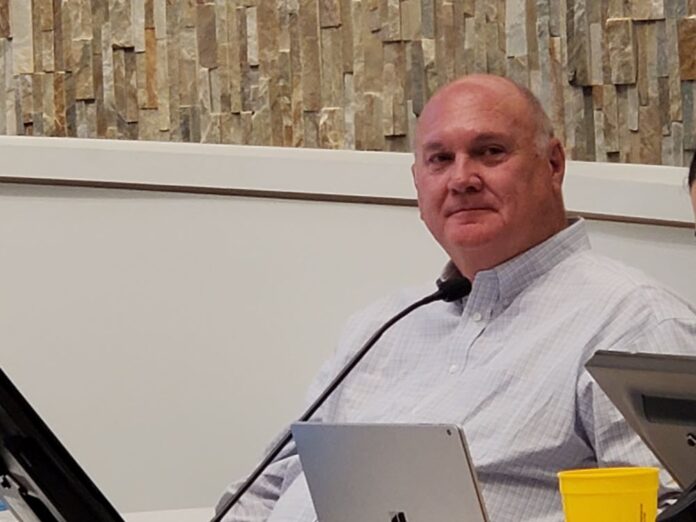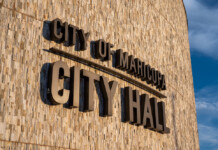
With a study into a potential merger with the city of Chandler on Emergency Call Center services now called off, Maricopa is looking to build its own facility and host operations for municipal partners.
The Chandler study was halted for a variety of reasons, according to City Manager Rick Horst.
“Chandler has recently advised us that they wish to pause this process,” Horst said. “Reasons include the recent retirement of their city manager and the ongoing recruitment process. Recent events in the city of Chandler have mandated their time and attention away from this study process and to some degree, misinformation circulated as promulgated by parties with self-serving agendas.”
The city has determined it cannot wait to move on its ECC plan.
“Therefore, both parties have determined to no longer pursue the Chandler study segment,” Horst continued. “Other study elements will continue.”
That includes the potential for shared services, state-of-the-art technology, increased effectiveness and efficiency and reduced costs while ensuring the safety of first responders and the public, he said.
Mayor Christian Price said the timing just wasn’t right for either side to make the collaboration with Chandler work.
“Planning takes time, and moving forward needs to happen at some point, especially with our dispatch equipment reaching the end of its life cycle,” Price said. “We also have the need to purchase more (equipment) in the very near future, so sometimes decisions have to be made based on timing.”
The Maricopa Fraternal Order of Police, the city’s largest police union, and the City of Maricopa Police Association (COMPA) opposed the joint center with Chandler.
A new 8,000-square-foot ECC facility is envisioned that would be four times the size of the existing facility in the Maricopa Police Department substation at Copper Sky.
Horst, who often professes disdain for the status quo, said at Tuesday’s city council meeting the city needs to always be looking for a better way to do things.
“Based on these objectives and our desire to upgrade services and not accept the status quo, we have determined that our best option is to pursue a new facility within the city large enough to meet our present and future needs, but also with the capability of hosting future (municipal) partners, and including inner-city needs and functions,” he said.
By hosting other cities’ ECCs operations, Maricopa could transform a taxpayer-funded service into a profit center, which could then help pay for other city facilities or services, Horst said.
Price said Maricopa likely would bear the construction costs since the facility would be owned by the city. But other technology and operational costs could be shared with prospective partners.
“The cost of the service, the 911 dispatch consoles, personnel, etc., would most likely all be cost shared as that is the whole reason for trying to reduce costs to the taxpayers of the region, and especially Maricopa,” Price said.
The new facility would represent the fourth generation of emergency communications in Maricopa. The MPD was founded in 2007, and at that time dispatch services were provided by the Pinal County Sheriff’s Office. In 2012, the city contracted with Buckeye for its dispatch services, then opened its current ECC facility center four years later.
In his presentation Tuesday, Horst noted the State of Arizona 911 Office is strongly encouraging cities to consolidate their ECC operations. According to the 911 Office, Public Safety Answering Points, or PSAPs, throughout the state who don’t meet required call volume or population to qualify for 911 funding are still receiving funding that can be eliminated at any time.
The state is encouraging cities to offer dispatch services to other jurisdictions and offering financial aid to facilitate such cooperation. Horst said the timing was right for the city to examine the existing facility and decide how to move forward.
“Our decision to pursue this is propelled by the condition and functionality of our existing facility,” Horst said. “And I want to strongly stress that I’m not talking about our personnel, because they’re terrific. But they are working with antiquated systems, and they have very little space to work in. In fact it was a real challenge during COVID because they couldn’t space very far apart and its hard to talk in Dispatch if you have to wear a mask.
Part of the decision to assess and relocate the current facility is the opportunity to repurpose the existing facility in support of a potential medical campus, Horst said.
No timetable was given for the start of construction on the ECC facility, and few specifics could be offered about operating budgets, jobs created, or construction costs that will be ultimately determined by the number of partner cities sharing the facility and the specific technologies they will be using.
Price indicated the new facility would most likely be built in the area of the police headquarters complex planned at Wilson and West Garvey avenues.


![Alleged car thief released without charges Phoenix police stop a stolen vehicle on April 20, 2024. [Facebook]](https://www.inmaricopa.com/wp-content/uploads/2024/04/IMG_5040-218x150.jpg)
![Locals find zen with Earth Day drum circle Lizz Fiedorczyk instructs a drum circle at Maricopa Community Center April 22, 2024. [Brian Petersheim Jr.]](https://www.inmaricopa.com/wp-content/uploads/2024/04/PJ_3922-Enhanced-NR-218x150.jpg)










![Alleged car thief released without charges Phoenix police stop a stolen vehicle on April 20, 2024. [Facebook]](https://www.inmaricopa.com/wp-content/uploads/2024/04/IMG_5040-100x70.jpg)
![Locals find zen with Earth Day drum circle Lizz Fiedorczyk instructs a drum circle at Maricopa Community Center April 22, 2024. [Brian Petersheim Jr.]](https://www.inmaricopa.com/wp-content/uploads/2024/04/PJ_3922-Enhanced-NR-100x70.jpg)
